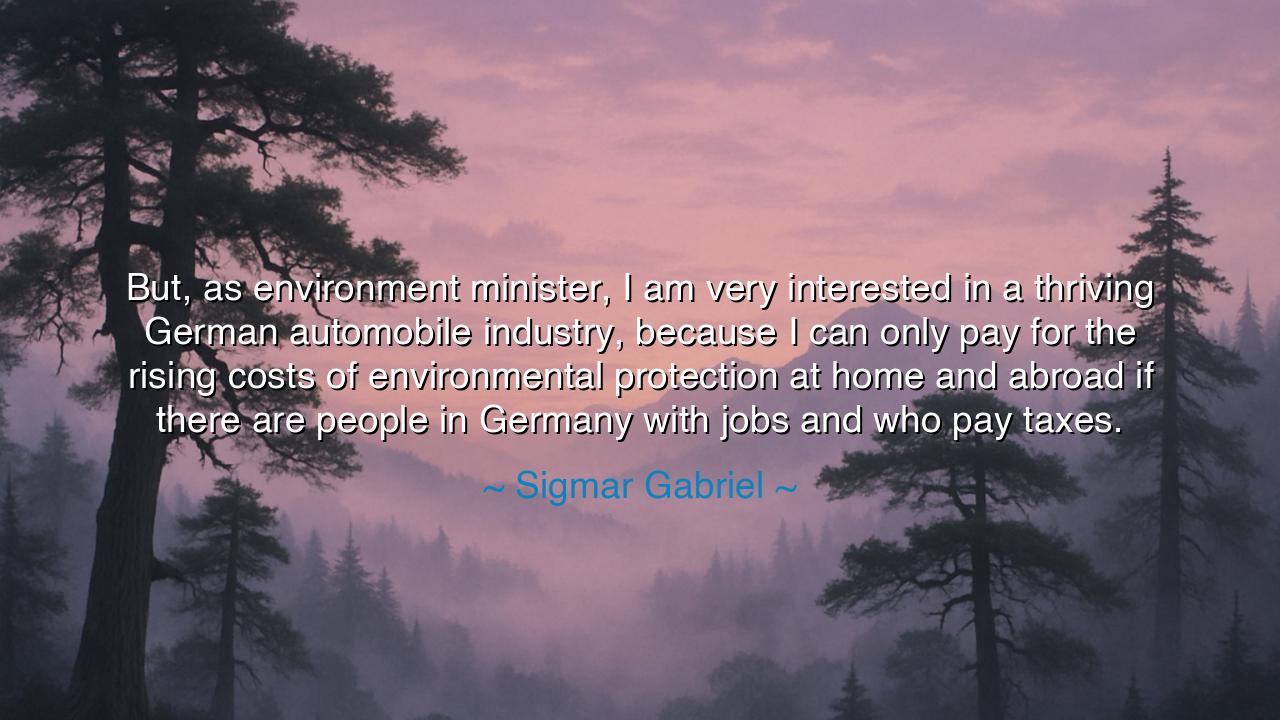
But, as environment minister, I am very interested in a thriving
But, as environment minister, I am very interested in a thriving German automobile industry, because I can only pay for the rising costs of environmental protection at home and abroad if there are people in Germany with jobs and who pay taxes.






The words of Sigmar Gabriel, “But, as environment minister, I am very interested in a thriving German automobile industry, because I can only pay for the rising costs of environmental protection at home and abroad if there are people in Germany with jobs and who pay taxes,” resound with the weight of paradox. They remind us that the shield of the earth must often be forged in the fire of industry, that the very wealth drawn from factories and labor must be turned back to heal the wounds those same engines create. This is no simple lament, but the eternal dilemma of statesmanship: how to reconcile prosperity with preservation, how to balance the toil of man with the survival of nature.
The origin of this statement lies in the halls of modern Germany, where industry is not merely a source of wealth but a symbol of identity. The automobile industry, with its roaring engines and renowned craftsmanship, has long been a pillar of German pride and power. Gabriel, speaking as environment minister, recognized a truth too often ignored: environmental protection requires treasure, and treasure comes from work, from wages, from the taxes of those who labor in thriving industries. To weaken industry in the pursuit of ecological purity, without replacing its strength, is to cut away the very foundation on which protection rests.
History offers a mirror in the story of the Industrial Revolution. In England, factories multiplied and wealth grew, but so too did smoke choke the skies and soot darken the cities. The people suffered from foul air and poisoned water, yet it was the very wealth of that industry which later allowed for reforms—sanitation systems, cleaner technologies, and the birth of environmental laws. Just as Gabriel declared, it was industry itself, once tempered and reformed, that provided the resources to mend what it had marred. The paradox is thus unveiled: industry is both the wound and the medicine.
But Gabriel’s words also carry a warning. He speaks of the “rising costs of environmental protection”—costs that grow each year as climate shifts, seas rise, and resources dwindle. These burdens cannot be borne by empty coffers. Without a thriving workforce and strong industries, the noble desire to protect the environment collapses into dream alone. His insight is not merely German, but universal: no nation can protect the earth if it cannot feed its people, and no people can prosper long if they destroy the earth that sustains them. The two must walk hand in hand, lest both fall into ruin.
The deeper meaning is the need for balance—jobs and justice, growth and guardianship. A society that worships industry alone will strip its land bare and leave future generations with ash. Yet a society that neglects industry altogether, clinging only to ideals, will find itself powerless to protect even a single forest. Gabriel calls us to the middle path: to cherish prosperity not for its own sake, but as a tool to finance the healing of the world.
The lesson for us is clear: each citizen must understand their role in this great cycle. The taxes we pay, the work we do, the industries we support—these are not merely personal matters, but the lifeblood of environmental stewardship. To demand clean rivers and clear skies while refusing to contribute through labor, innovation, or sacrifice is to desire fruit without planting trees. True protection of the earth requires not only words of outrage but the practical weaving of economy and ecology together.
Therefore, let us act with wisdom. Support industries that honor both labor and the land. Demand that governments direct wealth not toward wasteful luxuries, but toward environmental protection. Encourage innovation that makes prosperity and sustainability allies, not enemies. And in our own lives, remember that the balance Gabriel spoke of begins with us—when we work with integrity, when we pay fairly into the common good, when we choose products and leaders that protect both jobs and nature.
So let Gabriel’s words endure as a guiding truth: prosperity must fund preservation, and preservation must guide prosperity. To forget one is to endanger both. The task of our age is to make this balance real, so that the engines of industry do not roar only for profit, but for the protection of the earth, ensuring that future generations inherit both a thriving economy and a living planet.






AAdministratorAdministrator
Welcome, honored guests. Please leave a comment, we will respond soon